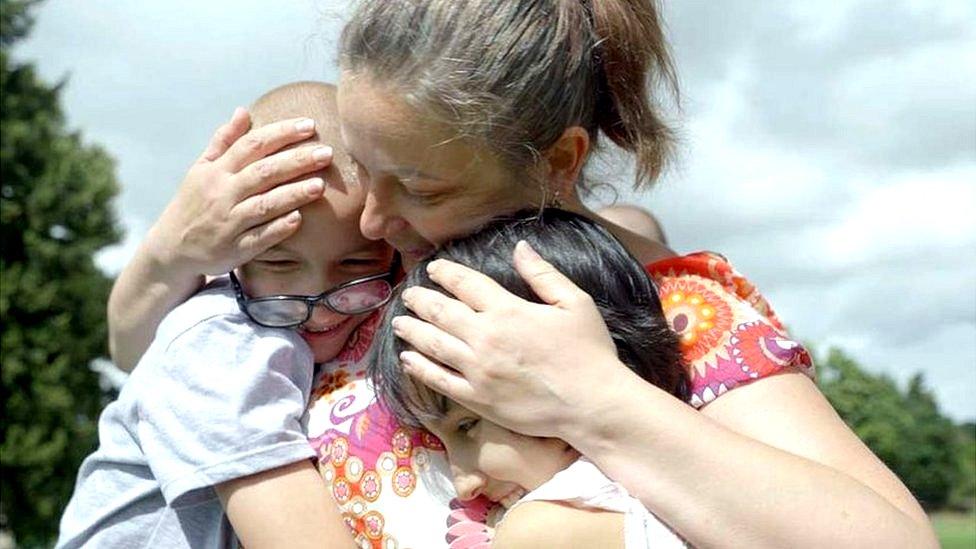Ukraine war: The mothers going to get their children back from Russia
- Published
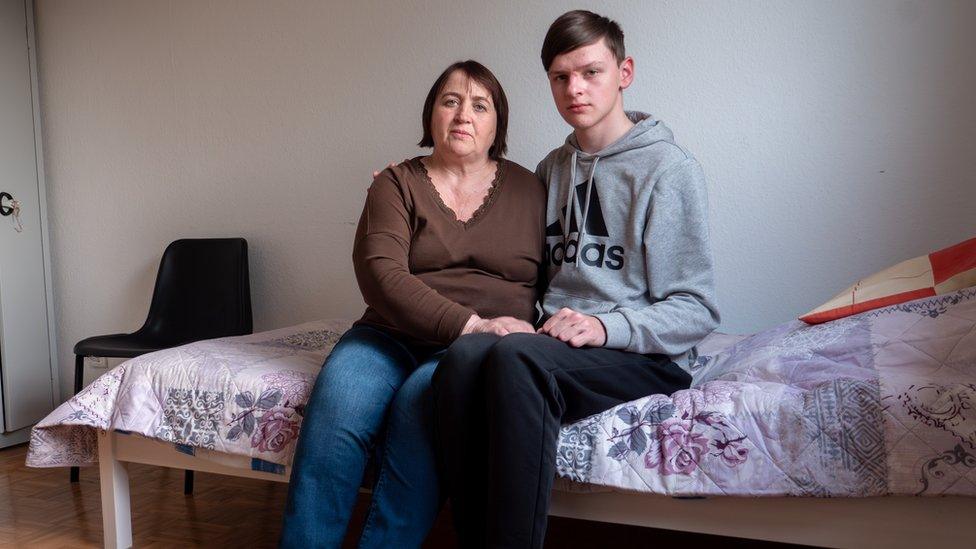
Tetyana Kraynyuk's son Sasha was one of 13 children taken by Russian troops from his special educational needs school last September
When 15-year-old Sasha Kraynyuk studied the photograph handed to him by Ukrainian investigators, he recognised the boy dressed in Russian military uniform immediately.
The teenager sitting at a school desk has the Z-mark of Russia's war emblazoned on his right sleeve, coloured in the red, white and blue of the Russian flag.
But the boy's name is Artem, and he's Ukrainian.
Sasha and Artem were among 13 children taken from their own school in Kupyansk, north-eastern Ukraine last September by armed Russian soldiers in balaclavas. Ushered onto a bus with shouts of "Quickly!", they then disappeared for weeks without trace.
When the children, who all have special educational needs, were finally allowed to call home, it was from much deeper inside Russian-occupied territory.
To get them back, their relatives were forced to make gruelling journeys across thousands of miles into the country that has declared war on them. Only eight of the children have been returned from Perevalsk so far and Artem was one of the last, collected by his mother just this spring.
When I reached the school's director by phone, she saw no problem with dressing Ukrainian children in the uniform of an invading army.
"So what?" Tatyana Semyonova retorted. "What can I do? What's it to do with me?"
I countered that the Z symbolised the war against the children's own country. "So what?" the director demanded again. "What kind of a question is that? No-one is forcing them."

Sarah Rainsford explores allegations of illegal deportation of Ukrainian children by Russia and meets some of the relatives who have been fighting to get them back

Scrolling through the website of Perevalsk Special School, I found the photograph of Artem on public display. It was taken in February 2023, a year after Russia's invasion of Ukraine, in a class to mark Defenders of the Fatherland Day.
The lesson was dedicated to learning "gratitude and respect" for Russian soldiers.
I tried to question the director some more, but the phone line abruptly cut out.
The wanted war criminal
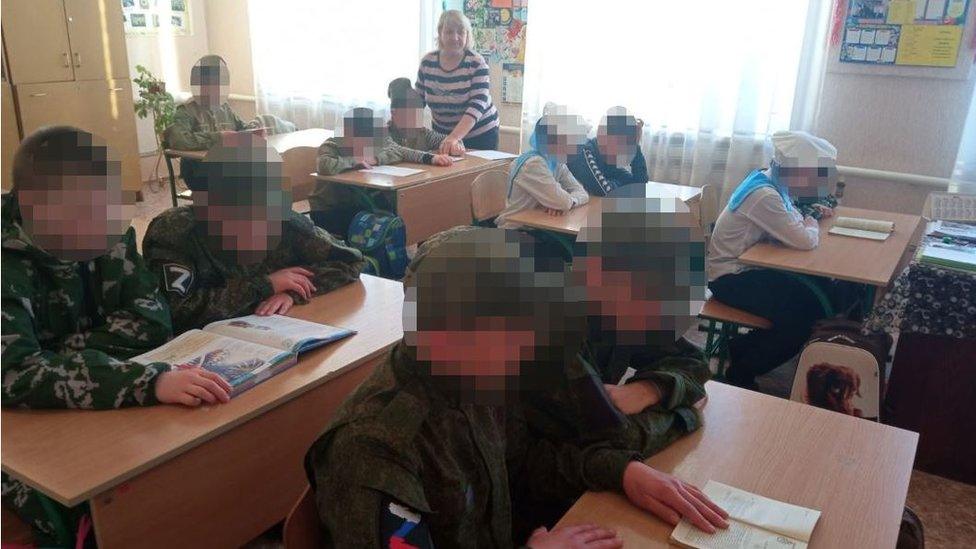
Ukrainian children were taken from their homes, dressed in Russian military uniforms, and taught the Russian curriculum
For Ukraine, the story of Kupyansk Special School is part of a growing body of evidence against Vladimir Putin as a suspected war criminal.
The International Criminal Court issued an arrest warrant for Russia's president in March, accusing him and his children's ombudswoman, Maria Lvova-Belova, of the unlawful deportation of Ukrainian children.
Russia insists that its motives are purely humanitarian, evacuating children to protect them from danger. Senior officials scorn the ICC indictment, even threatening retaliatory arrests against its representatives.
The ICC hasn't made the details of its case public and nor has Ukraine, but officials in Kyiv maintain that more than 19,000 children have been taken from occupied areas since the full-scale invasion. We understand that many have come from care homes and residential schools.
We investigated several cases, including another Special School in Oleshki, southern Ukraine, and found that each time Russian officials made minimal or zero effort to locate any relatives. Ukrainian children were frequently told there was nothing in their country to return to and were subjected, to varying degrees, to a "patriotic" Russian education.
The details and the nuance vary, as there is chaos in war as well as ill intention.
But there is also a clear, overriding ideology: Russia, led by Vladimir Putin, openly proclaims everything in occupied areas of Ukraine as its own, including the children.
Sasha's story
Kupyansk, north-eastern Ukraine
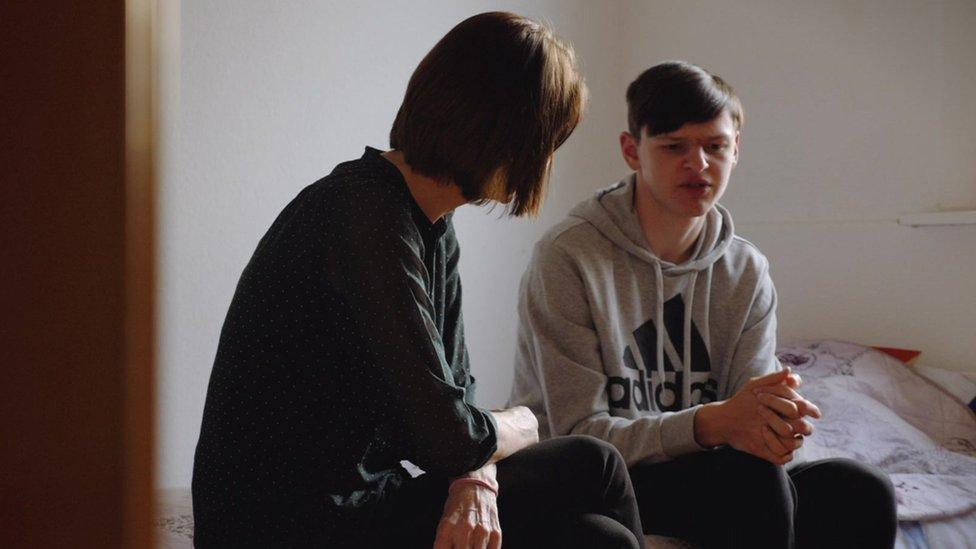
Sasha (right) told the BBC it was too distressing to talk about his separation from his mother
Sasha is a tall, shy boy with a long fringe that he likes to smooth into place like any self-conscious teenager.
Forced separation from family would be upsetting for any child. For someone vulnerable, like Sasha, it was deeply unsettling. His mother, Tetyana Kraynyuk, tells me he's still withdrawn, months after they were reunited. The 15-year-old even has grey hairs from all the stress.
They're now living in the western German town of Dinklage as refugees where, after school, Sasha mainly lies on his bed playing on his phone. But he remembers very clearly the moment when Russian soldiers took him away.
"If I'm honest, it was scary," Sasha admits in his quiet voice, rubbing his hands back and forth on his thighs. "I didn't know where they would take us."
When I ask about missing his mum he pauses for a long time, says it's too distressing for him to remember and asks if he can change the subject.
Before the war, Sasha went to Kupyansk Special School in north-eastern Ukraine. He would board during the week, returning home at weekends, but when Russia invaded in February 2022, much of the Kharkiv region was overrun immediately and Tetyana kept her son home for safety.
As September approached, the occupying administration began insisting that all children return to school, now with the Russian curriculum. There was the same push in all occupied areas, often using teachers from Russia to replace those locals who refused to collaborate.
Tetyana was reluctant to send Sasha back, but the teenager was bored stiff after seven months in their village, so on 3 September she dropped him off in Kupyansk.
Days later, Ukrainian forces launched their lightning operation to re-take the region.
"We heard the noise from miles away. The booms. Then the helicopters and the firing. It was a terrible din. Then I saw the tanks and the Ukrainian flag," Tetyana remembers of the counter-offensive.
Unable to contact her son, she was frantic.
"When we reached the school only the caretaker was left. He said the kids had been taken and no-one knew where," Tetyana says.
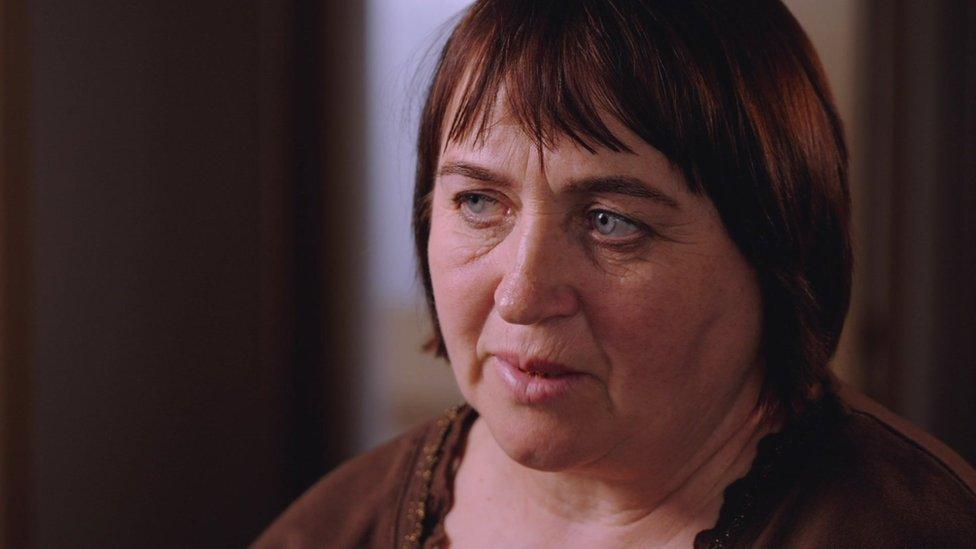
Tetyana went weeks not knowing what had become of her son
A teacher saw what happened that day, when as many as 10 heavily armed Russian soldiers "swooped into" the school.
"They didn't care about taking any documents or contacting parents," Mykola Sezonov told me, when we met in Kyiv. "They just shoved the kids in a bus with some refugees and left."
I put to him Russia's defence in such cases: that it was removing children from danger.
"I lived under Russian occupation, and I know the difference between what they say and what I see for myself through the window," was the teacher's response.
For six weeks, there was no word of the children.
"I cried every day, called the hotline and told them I'd lost my son and wrote to the police. We tried to find him through volunteers," Tetyana says.
It was a full month before a friend spotted a video on social media, dated early September 2022. It reported that 13 children from Kupyansk Special School had been moved east to a similar facility in Svatove, still under Russian control.
Another fortnight after that, Tetyana's phone beeped with a message: Sasha was at a Special School in Perevalsk, she read, and his mum could call to talk to him.
"He was happy to hear me, of course. But he really cried," Tetyana recalls of the moment they spoke. "They'd told him his home was destroyed and he'd been afraid we were gone too."
Communication with areas of heavy fighting is not easy, but the Kupyansk children passed through three institutions before anyone tried to reach any relatives.
"There was nothing. Only from Perevalsk, and even then not immediately. I think they did it on purpose," says Tetyana.
Her struggles weren't over.
She would have to return Sasha home in person, but the direct route crossed the frontline. Instead, Tetyana travelled from Ukraine through Poland and the Baltics before crossing on foot into Russia, where the FSB Security Service then interrogated her about Ukrainian troop movements.
She had nothing to tell.
"It was pitch dark, there were checkpoints, men in balaclavas with guns. I was so scared I took pills to calm me," Tetyana remembers of the rest of the trip into occupied eastern Ukraine.
She had another reason to be frightened. By then, Russia was openly taking children from care homes in occupied areas and placing them with Russian families.
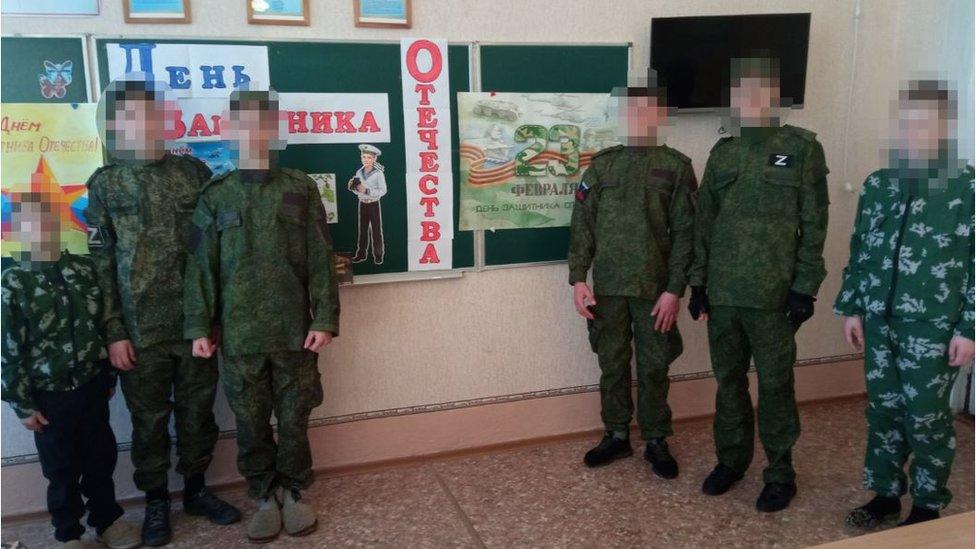
Russia has changed its laws to make it easier to adopt Ukrainian children
The Telegram channel of the children's ombudswoman is full of videos showing her escorting groups of Ukrainian children across the border, where bewildered youngsters are greeted by Russian foster parents with gifts and hugs as the cameras roll.
We sent two requests for an interview with Maria Lvova-Belova and got no reply. But the message from all her posts is clear: Russia is the good guy in what it still refuses to call a war. Russia claims it's saving Ukrainian children.
By the time Sasha disappeared from Kupyansk, Vladimir Putin had already amended the law to make it easier for Ukrainian children to get Russian citizenship and be adopted. In late September he announced the annexation of four regions of Ukraine, including Luhansk where Sasha was then located.
In public and online, Maria Lvova-Belova referred repeatedly to children in those regions as "ours". She adopted a teenager from Mariupol herself, posting pictures with his new Russian passport.
"I was afraid that if they took Sasha into Russia, I would never find him. I was afraid he'd be put in a foster family, just like that," Tetyana tells me.
"What have our children got to do with anything? Why did they do this to us? Maybe it's just to cause us pain, like with everything else."
So when she finally reached Perevalsk, after an exhausting five days on the road, Tetyana hugged her son to her tightly. Sasha didn't say a word. He was crying from happiness.
Danylo's story
Kherson, southern Ukraine
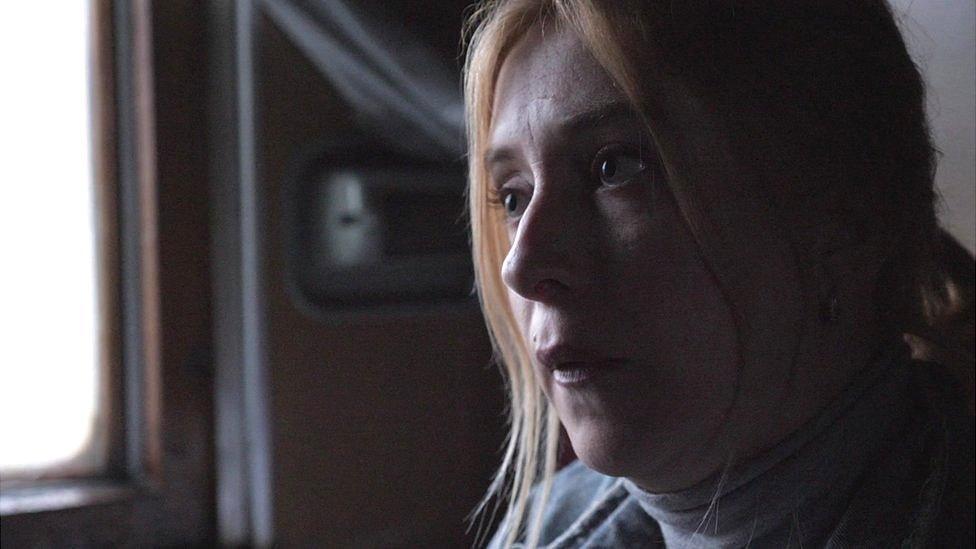
The BBC joined Alla Yatsenyuk and a group of other mothers as they made their way to Russia to save their children
For six months, Alla Yatsenyuk felt like part of herself was missing.
When she packed her 13-year-old son off to camp in Crimea, she thought Danylo was heading for two weeks by the sea. It was meant to be a break from the stress of war: other kids from Kherson had been to camp and come back, so Alla wasn't worried.
Besides, their city had been occupied since the very start of the invasion and by October 2022, she'd begun to think Russia would control Kherson for good, though she didn't want that.
But days after Alla waved Danylo off, the officials responsible for him announced that the children would not return. The Russians had begun retreating from Kherson. If the children's parents wanted them back, they were told they should come for them.
Alla pleaded with the regional administration but was told they would only return the children "when Kherson is Russian again." She called the Prosecutor's Office in Crimea, but they insisted she had to get Danylo herself.
And so for weeks, Alla reassured her son that she was coming for him even as she tried to work out how.
The distance from Kherson to Yevpatoria is short but the direct route was closed by the Russian military and a far longer route through Zaporizhzhia was too dangerous. "There was a less than 5% chance of getting there and back safely," Alla was told.
She would also need around $1,500 (£1,200) for a driver, as well as her first ever passport and all the paperwork the Russians were demanding to prove her link to her son.
Alla was already starting to despair when Danylo said officials at his camp were threatening to place the children in care if their parents didn't hurry.
"The kids have been calling us in panic, saying that they don't want to end up in homes," Alla fretted. "And Russia is huge! Where would we look for them then?"
We met as she finally set off in a train carriage full of other mums and grandmothers on the most anxious journey of their lives.
The women were being helped by a group called Save Ukraine, which stepped in when it emerged that hundreds of Ukrainian children might be stranded. Some were from broken homes or less well-off families, struggling with the logistics and funding for the trip. Other parents had been hesitant about returning their children to cities under heavy Russian fire.
But Alla couldn't wait any longer.
"I still have this gnawing worry something will go wrong. It will be there until I have my son next to me. Then I can breathe again."
Over a week later, Alla was one of the last to cross the border back from Belarus, dragging a big suitcase into Ukraine past concrete boulders and anti-tank defences. Danylo, with his dimpled grin, was finally safe beside her.
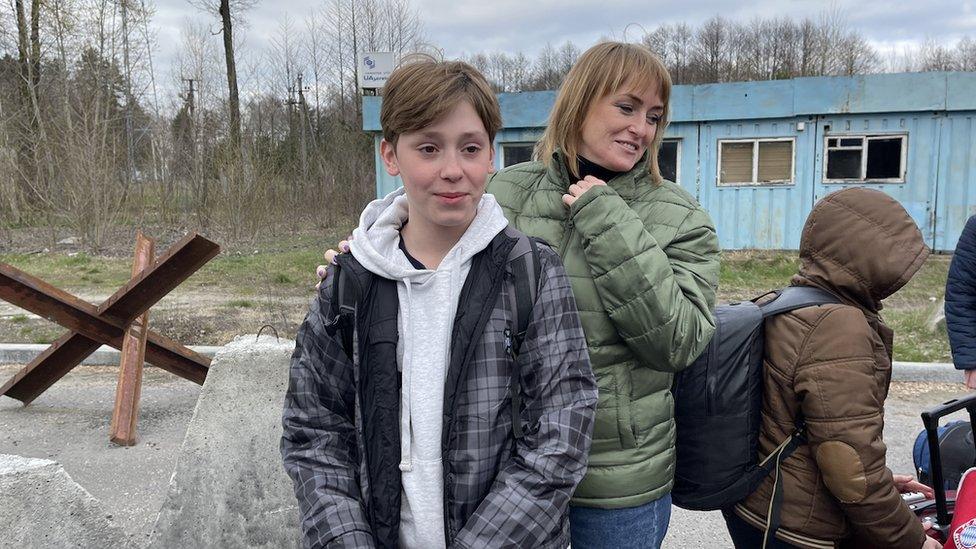
Danylo (centre) as he crossed the border from Belarus into Ukraine after months away from home
There had been moments when she thought she wouldn't make it.
Save Ukraine had instructed the women to turn off their phones when they entered Russia, so the details of their traumatic journey only began spilling out between welcome hugs.
"They kept us like cattle, separate from anyone else. Fourteen hours with no water, no food, nothing," Alla described being held by Russia's FSB security service at a Moscow airport. "They kept asking us what military equipment we had seen, they checked our phones a million times and asked about all our relatives."
The women continued the 24-hour drive south to Crimea. As they drew close, they stopped for a break and 64-year-old Olha Kutova took a couple of steps, collapsed, and died by the side of the road. After days cramped-up in a minibus, in a state of stress, her heart had given out. Now Save Ukraine is trying to return Olha's ashes, as well as her granddaughter.
Eventually, Alla made it to the camp.
"The moment I saw my child running towards me in tears, it made up for everything we'd been through," Alla described her reunion, at last, with Danylo.
Her son tells me it was "just brilliant!"
Save Ukraine returned 31 children that day and several confirmed that camp staff had threatened to place them in care, which had scared them.
They talked of being taken on excursions at the start, and being reasonably fed and clothed. But on Russian-controlled territory they were treated and taught as Russians. When inspectors visited from Moscow, the Ukrainians had to line up beside the Russian flag and sing the Russian anthem.
In October, the occupying administration of Kherson posted a video on Telegram of such a moment. Russia's anthem booms through loudspeakers and the tricolour flag is unfurled. But look a little closer and it's clear that none of the children's lips are moving.
The camera operator suddenly realises that one girl has her hands over her ears to block out the sound. Too late, they zoom away from her.
Going home
A few weeks after her return, I call Alla in Kherson.
"Everything was finally over, once we made it here," she tells me cheerfully down the line.
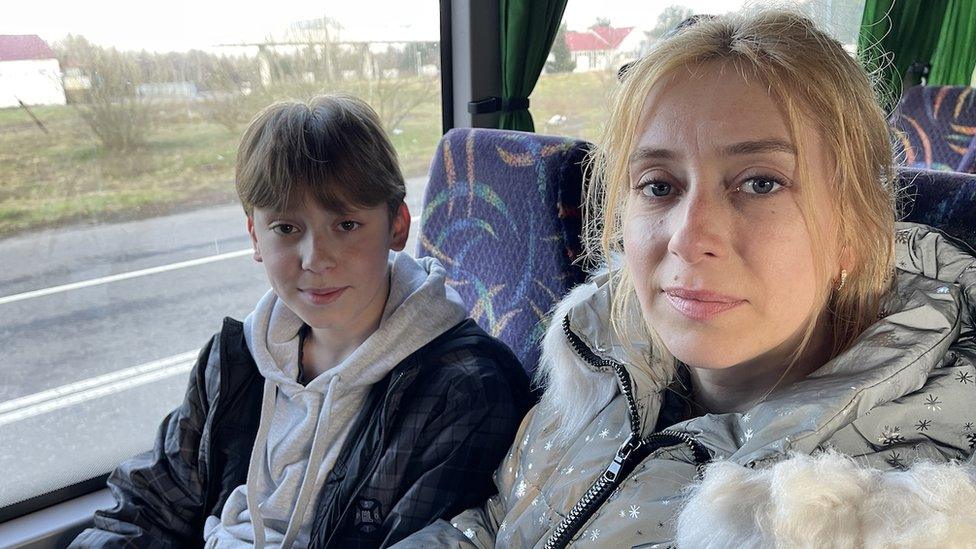
Danylo has finally been reunited with his mother Alla
She admits there was some bad feeling towards the summer-camp mums at the start, seen as "collaborators" for sending their children to Russian-run facilities in the first place. But Alla feels that has faded.
In her own family, Danylo is back to bickering with his younger brother and studying online, in Ukrainian. But with no internet at home, she has to dash into the city centre to hunt for wi-fi to download his schoolwork, and that's risky.
Since the Russians were forced into retreat, abandoning Kherson, they've been taking their revenge on the city from across the river.
"They're shelling from morning to night," Alla confirms, though she says their house is relatively far from Russian positions. They have no plans to leave.
Danylo is still in a group chat with the other children from camp and most who remained have now been collected. But he says five were transferred to a care home somewhere in Russia.
Alla forwards me a photograph of their room with rows of single beds, a cheap rug and a spider plant. Where the left-behind children go from there isn't clear.
The missing children
In rural Germany, Sasha has had time to settle into life and another new school, but Tetyana is finding the adjustment a little harder.
In their flat, over a pile of sprat sandwiches, she explains that her eldest son is still in Ukraine expecting to be called up to fight any day. Tetyana wants nothing more than to go home to her husband, too, but Kupyansk is under heavy fire again.
In late April, Russian missiles destroyed the local history museum, killing two women. Before that, Sasha's old school in the city was badly damaged when missiles landed nearby.
Eight months after he and the other children were taken from there, five still remain in Russian-controlled territory. The director of the school where they ended up, Tatyana Semyonova, confirmed that when I called.
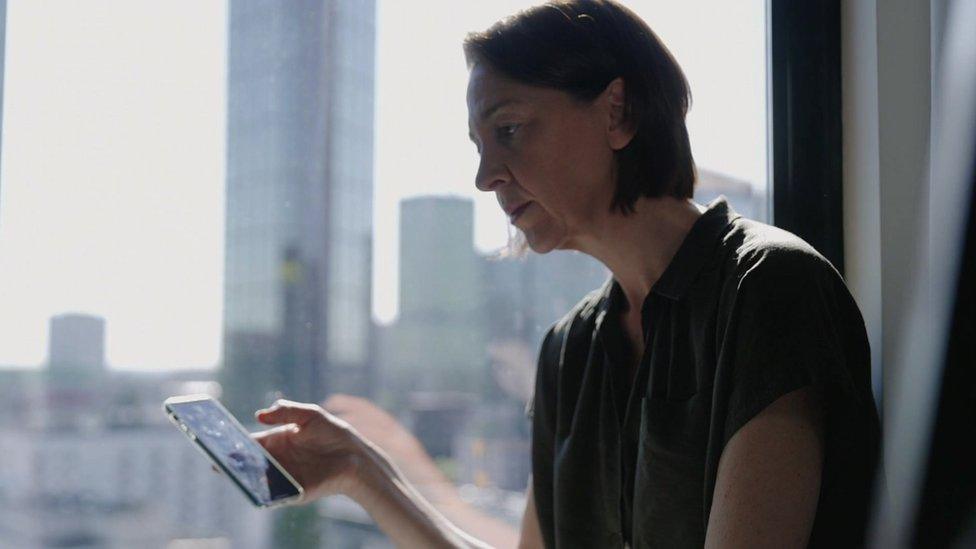
The BBC's Sarah Rainsford managed to speak to the director of the school over the phone
I was surprised she agreed to talk at all, but the Russian number I used must have confused her. So did my questions.
The director claimed no-one had been in touch about the five, which we know isn't true, and insisted she would hand them "straight back" as soon as their legal guardians come to collect them.
But that's unlikely: various sources tell me the children are treated as "social orphans", whose parents are alive but who are not allowed or able to care for them.
When I asked why Russia could take children without permission from Ukraine, but demanded a pile of paperwork to return them, Tatyana Semyonova was short.
"What's that got to do with me? I didn't bring them here."
On the website of her school in Perevalsk, I see a large picture of the director staring out, bleached hair sitting on a strip of dark brown like she's wearing a helmet. The photographs of Artem, Sasha's classmate, with a Z mark, are publicly displayed on the same site.
Sasha has identified two more of the missing children from Kupyansk among the school pictures: 12-year-olds Sofiya and Mikita are dressed up and standing in line to celebrate the Russian military.
I ask Sasha's mother what she makes of the arrest warrant issued for Russia's president.
"Not only Putin, but all his main people - all the commanders - should be on trial for what they did to the kids," Tetyana Kraynyuk answers, without hesitating.
"What right did they have [to take the children]? How were we supposed to get them back? They just didn't care."
Production by Mariana Matveichuk
Photos by Matthew Goddard and Sarah Rainsford
Related topics
- Published25 June 2022
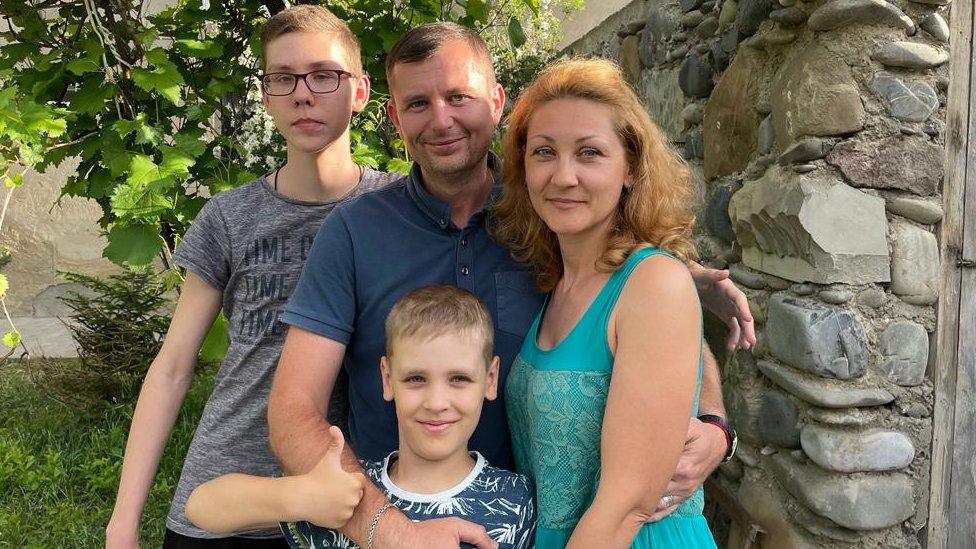
- Published31 August 2022
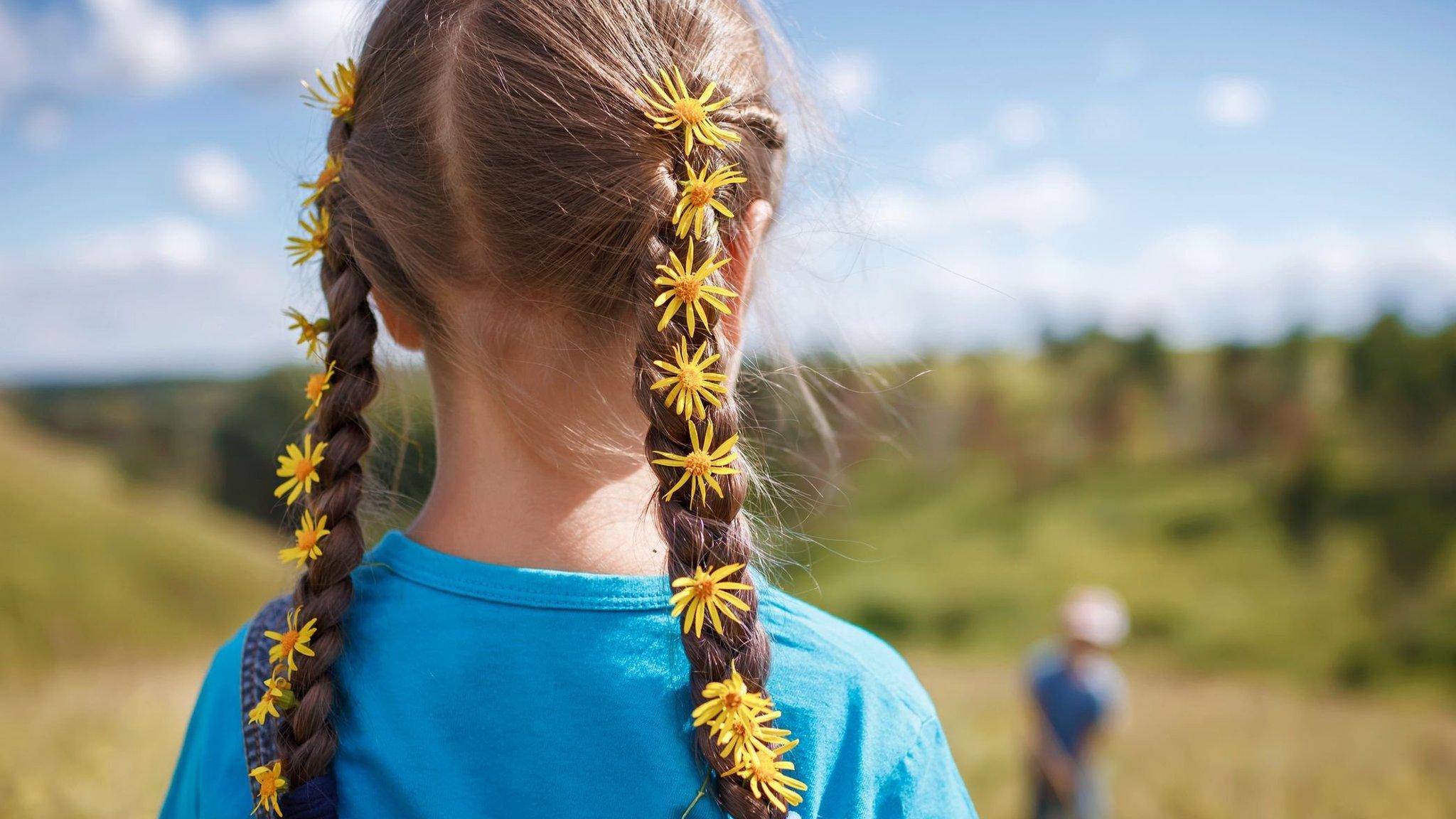
- Published18 July 2022
